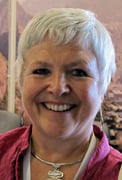Policy Bite: Ideas into impacts
How can WONCA make the best of our communication networks?
español
 Amanda Howe, President Elect writes:
Amanda Howe, President Elect writes:
Our modern world is full of information – we can follow friends and fellow professionals through multiple forms of social media, and could spend our whole day in Twitterland and virtual networks.
Rich resources exist on the Internet, whether we read them for educational, political, or practical purposes. And as an academic and a leader in family medicine, I am constantly trying to increase the impacts of our research and efforts on the views and actions of others. When we discuss how to do this, often the answer is ‘write more’, or ‘make it more available’. My inbox at the clinic is full of emails drawing my attention to new products, guidelines, services, conferences, and publications. Well -meaning managers say “We told you….” ( i.e. they put a message about the new pharmacy arrangements on page 11 of the daily staff bulletin). Often feeling overwhelmed myself, I want to know how best to use the wonderful opportunities of the global WONCA network to good effect.
Members will know our basic tools – the weekly e-updates, the monthly newsletter, the Global Family Doctor website, and the links to resources, talks, conference proceedings, and new publications. We rely on member organisations (MOs) and groups both to give us relevant material AND to disseminate our communications – hopefully many MOs pass WONCA links on to their members. We have had great outputs on best use of social media from groups such as Vasco da Gama[1] and Rural[2], and these are a really rich way of hearing about new outputs and asking questions – through blogs, Tweetchats, and the use of online meetings – as in the exciting Rural Cafés being led by Mayara Floss from Brasil.
But I am going to suggest we could do one thing better with the rich resources of our members. We could have more focused ‘big conversations’ on some of the key topics for our discipline. We have many policy experts in our community, and many of the MOs are writing papers and strategies regularly for use in their own country. I have been writing policy bites for three years now, and often get comments back, but we do not structure these conversations. We need to make this more ‘two way’ – to find ways to test ideas and get feedback, or to learn about differences between regions which might refine a policy and improve its applicability. As Don Berwick of the Institute of Health Improvement said in a recent interview[3]
“Great innovation has bi-directional kinetic energy: ‘top-down’ and ‘bottom-up’ at the same time. From the ‘top’ can come resources, clarified aims, permission, and assets for collective learning. From the ‘bottom’ can come great ideas, tested, de-bugged and exciting. …”. The idea here is about learning from others, and passing that on.
So when I start as President in November, I shall stop doing my own policy bites, and start asking others to host these, bringing forward a different author each month and hopefully allowing them to host a social media debate in addition to the short column in the newsletter. Different member organizations can play a part, and this will get their work more visible as well as adding energy and insights. I hope this will add another dimension to our communications strategy and add value for members. @WoncaWorld #bigconversations. Watch this space!
1. See
Navigating the Sea of Soci@l Media
2. Ewen McPhee (a rural GP in Australia) gave an excellent
Masterclass on Social Media was showcased in the WONCA July newsletter.
3. Chris Ham in conversation with Don Berwick for the Kings Fund August 2016 – downloaded 22/8/16
hwww.kingsfund.org.uk/publications/articles/why-nhs-needs-quality-improvement-strategy